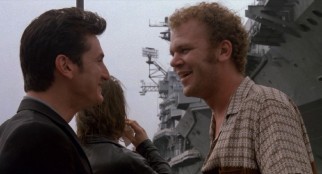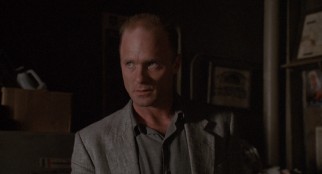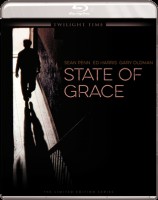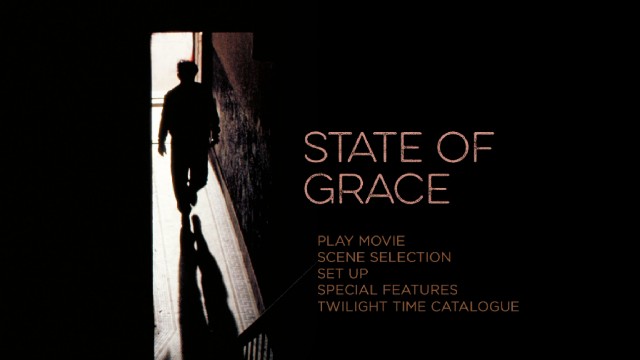State of Grace: The Limited Edition Series Blu-ray Review
 |
State of Grace
Theatrical Release: September 14, 1990 / Running Time: 134 Minutes / Rating: R Director: Phil Joanou / Writer: Dennis McIntyre Cast: Sean Penn (Terry Noonan), Ed Harris (Frankie Flannery), Gary Oldman (Jackie Flannery), Robin Wright (Kathleen Flannery), John Turturro (Nick), John C. Reilly (Stevie McGuire), R.D. Call (Pat Nicholson), Joe Viterelli (Joe Borelli), Burgess Meredith (Finn), Deirdre O'Connell (Irene), Marco St. John (Jimmy Cavello) |
Buy State of Grace on Blu-ray at Amazon.com
In September of 1990, a mere week before the release of Martin Scorsese's Goodfellas, another drama about modern New York mobsters opened in US theaters. State of Grace was not based on true crime or a bestselling novel like The Godfather, State of Grace opens with Terry Noonan (Sean Penn) agreeing to perform a drug deal. The exchange of money for narcotics goes awry and two are killed. Terry drifts into a bar where he reconnects with Jackie Flannery (Gary Oldman), an old friend he hasn't seen in years. Twelve years, in fact. Despite the estrangement, Terry is swiftly welcomed back into the Hell's Kitchen Irish-American crime family that is now being run by Jackie's older brother Frankie (Ed Harris).
Oddly, no one asks where Terry has been or why he's reappearing here now. The movie delays answering those pressing yet unasked questions until 50 minutes in, by which point Terry has become a trusted member of the Flannery gang, reconnected with Jackie and Frankie's sister Kathleen (Robin Wright), who maintains her distance as a manager at an upscale hotel, and had an old childhood friend (John C. Reilly, in one of his earlier credits) also with the family found dead over an $8,000 debt.
That hit is performed out of respect to the unpaid party, the head of a neighboring territory's Italian-American crime family with whom there is some bad blood. But the nature of the crime is kept hidden from Terry and the grungy, hot-headed Jackie, both of whom are broken up by it. Their respective responses escalate the tensions between the two families, putting them on the brink of a turf war.
State of Grace was the third feature credit of director Phil Joanou, who had previously helmed the appealing high school comedy Three O'Clock High (1987) and the U2 documentary Rattle and Hum (1988). State would move Joanou in a darker direction, something he has maintained in a filmmaking career consisting of sporadic fringe to mid-level thrillers like Kim Basinger's Final Analysis (1992) and Alec Baldwin's Heaven's Prisoners (1996). Joanou is scheduled to pick up his first feature directing credit in nearly a decade on the upcoming horror movie The Veil starring Jessica Alba and Thomas Jane. The director's best-known work may be the somewhat well-regarded Dwayne Johnson juvenile delinquent football drama Gridiron Gang.
Despite boasting interesting performances from a number of actors who have stayed relevant and respected to this day, State has largely been forgotten by the public a quarter-century after its release. It's tempting to say that State was eclipsed by Goodfellas, but that film took a while to earn its classic status, whereas State was largely dead on arrival, expanding to 192 theaters on Goodfellas' opening day, but being unable to get anywhere close to the weekly top ten amidst such films as Ghost, Flatliners, Presumed Innocent, Darkman, and Young Guns II.
State is an altogether different beast from the flavorful and stylish Goodfellas. Though nearly as filled with profanity, it is a relatively austere and somber production, at least until its improbable yet inevitable finale. While it sneaks in some recognizable songs from Guns N' Roses, The Rolling Stones, and U2 (whose music videos McIntyre often directed throughout the '90s and into the Noughties), it relies more frequently on a classical score by Ennio Morricone. That sound may invite comparisons to Sergio Leone's epic Once Upon a Time in America, but in other ways, State resembles a gritty 1970s movie. The New York it depicts at the start of the '90s is closer to the one seen in Scorsese's Mean Streets and Taxi Driver than the revitalized, family-friendly one to emerge from Rudy Giuliani's century-ending mayorship.
Apart from an eruption and a breakdown, Penn plays the protagonist with understatement. As such, he is overshadowed by the firecracker Oldman, then still on the cusp of recognizability. Even if the movie's depiction of criminals doesn't seem grounded in reality or research (one enforcer eats a handful of nuts immediately after killing somebody), On the other hand, Wright isn't convincing as a crime family sister preferring the safety of legitimacy. Equidistant from her more light-hearted two landmark credits (The Princess Bride and Forrest Gump), this film's biggest significance to her is for introducing her to Penn, sparking a relationship that would produce two children (pregnancies requiring her to bow out of Robin Hood: Prince of Thieves and The Firm) and a 14-year marriage quite long by Hollywood standards.
State of Grace grossed just $1.9 million in theaters, which was still several times more than what The Boondock Saints, a film whose Irish-American crime depictions it now calls to mind, would gross in super limited theatrical release ten years later. Naturally, this product of the long-defunct Orion Pictures has made its way to Blu-ray from Twilight Time, the boutique label that has been happy to handle many an MGM library cast-off.
VIDEO and AUDIO State of Grace looks pretty good on Blu-ray, though the transfer won't take your breath away. The 1.85:1 element maintains decent detail despite the dark palette. It is plagued by the occasional blink-and-miss white speck and scratch, which might be imperceptible if not being scrutinized on a large screen display. The 5.1 DTS-HD master audio presentation finds the soundtrack holding up nicely. The foul-mouthed dialogue is easily heard and complemented by both the Morricone score and infrequent needle drop, all of it even-keeled, if modestly spread out.
BONUS FEATURES, MENUS, PACKAGING and DESIGN The most noteworthy bonus feature found here is a Perhaps because he's not someone asked to record many commentaries, Joanou makes the most of this opportunity, needing a bare minimum of prompting to fill the air with spirited and interesting revelations about the film and its making. Among the topics addressed are alterations made (Michael Gambon was deleted from the film), the script contributions of the uncredited David Rabe, casting, the cast's chemistry, struggling to earn an R rating, the real Westies gang being dramatized, the difficulties such a "slow burn" film would face being made today (he repeatedly laments the current state of cinema), his influences, the crime genre, how U2 nearly scored the film, how Ennio Morricone actually did score the film, and Joanou's disheartening personal career trajectory. The other film-enhancing extra is a Twilight Time standard: an isolated score. While other Twilight Time discs may leave sound effects or licensed music intact, this track is truly an isolated score, presenting Ennio Morricone's score and nothing else in 2.0 DTS-HD master audio. Even if you are not compelled to revisit the film in full this way, it's nice to have the option, especially since the score hasn't been in print in ages. On the video side, we get two trailers: State of Grace's 1990-cool original theatrical trailer (1:32) in standard definition and MGM's 90th anniversary promo (2:06) in HD. Silent but for navigation sounds, the static menus adapt the cover art and include a complete Twilight Time catalogue gallery. The Blu-ray doesn't support bookmarks, but gladly does resume unfinished playback. The final extra is found inside the case, a clear variation of Blu-ray's standard blue packaging: an 8-page booklet featuring another fine essay from in-house historian Julie Kirgo, which discusses the gentrified setting, the characters, and the technical components.
CLOSING THOUGHTS While it's no Goodfellas, forgotten fellow 1990 crime drama State of Grace is a pretty competent and engaging film that includes some strong early performances from enduring talents. With its good feature presentation and new audio commentary, Twilight Time's Blu-ray should do a bit to rescue this box office non-starter from its present obscurity. Buy State of Grace on Blu-ray at Amazon.com
|
Related Reviews:
DVDizzy.com | DVD and Blu-ray Reviews | New and Upcoming DVD & Blu-ray Schedule | Upcoming Cover Art | Search This Site
DVDizzy.com Top Stories:
Goodfellas • The Godfather Part III • Scarface • The Color of Money • Jackie Brown • On the Waterfront
Sean Penn: U Turn • The Game • This Must Be the Place • Gangster Squad • The Thin Red Line
Ed Harris: Run All Night • Gone Baby Gone • The Firm • Snowpiercer | Gary Oldman: Bram Stoker's Dracula • Lawless • Paranoia
Robin Wright: Forrest Gump • The Princess Bride • The Conspirator | Burgess Meredith: Rocky
John C. Reilly: Cyrus • Step Brothers • Check It Out with Dr. Steve Brule
Text copyright 2015 DVDizzy.com. Images copyright 1990 Orion Pictures and 2015 Twilight Time, Metro Goldwyn Mayer Home Entertainment. Unauthorized reproduction prohibited.






